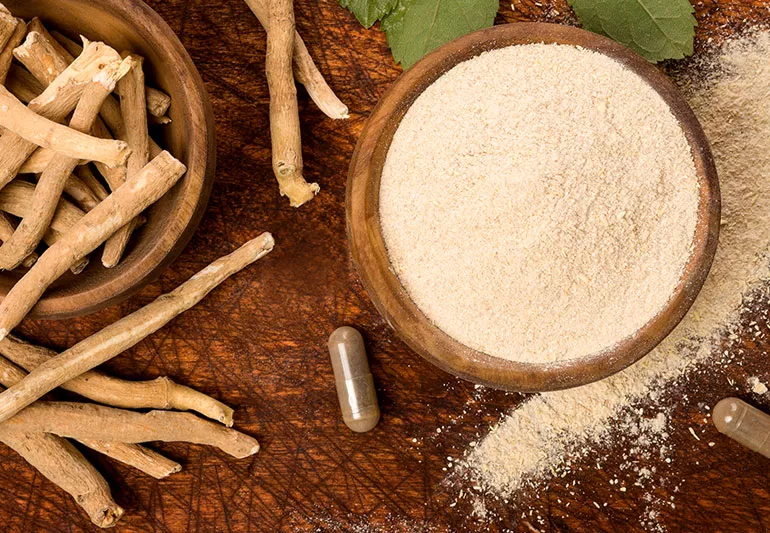INTRODUCTION
Ashwagandha (WI Thania somnifera), also known as Indian ginseng or winter cherry, is a medicinal herb used in traditional Ayurvedic medicine. It is prized for its adaptogenic properties, meaning it helps the body manage stress and maintain balance. The plant’s roots and berries are commonly used to prepare extracts or powders, believed to improve energy, reduce anxiety, enhance cognitive function, and boost overall vitality. Ashwagandha has gained popularity in modern wellness for its potential health benefits, such as reducing inflammation, promoting relaxation, and improving sleep quality.
Forms
Ashwagandha is available in various forms, each suited for different uses and preferences:

- Powder: The dried root is ground into a fine powder, traditionally mixed with water, milk, or honey. It can also be added to smoothies or teas.
- Capsules/Tablets: These contain powdered ashwagandha root or extract, making it convenient for those who prefer a pre-measured dosage without needing to mix it into a liquid.
- Tincture: This liquid extract is made by soaking the root in alcohol or another solvent. It is often consumed in small doses, mixed with water or juice.
- Tea: Ashwagandha root is sometimes used as an ingredient in herbal teas, offering a mild way to consume it, particularly for relaxation or sleep.
- Extracts: These are concentrated forms of the active ingredients, often standardized to ensure specific amounts of compounds like withanolides. Extracts are usually stronger than powders.
- Topical Applications: Ashwagandha is sometimes found in creams, oils, or ointments, used externally to soothe the skin or joints.
Health Benefits
In our busy lives, stress and anxiety are common problems. But there’s a natural remedy that’s been gaining attention for its amazing health benefits—Ashwagandha. This herb is famous for reducing stress, but it offers many other benefits too. Some of them are described below:
Relieves Stress and Anxiety
One of the most well-known benefits of Ashwagandha is its ability to alleviate stress and anxiety. It contains compounds that can help calm the mind and promote relaxation, making it an excellent natural remedy for those struggling with everyday stressors.
Increases Muscle and Strength
For fitness enthusiasts, Ashwagandha offers promising benefits for muscle growth and strength. It contains compounds that may support muscle recovery and enhance physical performance, making it a popular supplement among athletes and bodybuilders.
Improves Sexual Function in Women
Ashwagandha has been found to have positive effects on sexual function in women. It may help improve arousal, lubrication, and overall sexual satisfaction, making it a natural solution for enhancing intimacy.
Sharpens Focus and Memory

In today’s demanding world, cognitive function is essential for productivity and overall well-being. Ashwagandha has been shown to enhance cognitive function, including memory and focus, helping individuals stay sharp and alert throughout the day.
Supports Heart Health
Maintaining a healthy heart is vital for longevity and overall health. Ashwagandha offers cardiovascular support by helping to regulate blood pressure, cholesterol levels, and reducing inflammation, thus promoting heart health.
Hair Benefits
Ashwagandha isn’t just beneficial for internal health—it can also promote hair growth and improve hair health. Its antioxidant properties help protect the scalp from damage, while its anti-inflammatory effects may help reduce hair loss and improve hair texture.
Hormonal Balance Support
Hormonal imbalances can affect both men and women. Ashwagandha acts as a natural adaptogen, helping the body achieve and maintain hormonal balance.
Improve Sleep
Many people take ashwagandha to promote restful sleep, and some evidence suggests it may help with sleep issue.
Helps with Depression
Some studies suggest ashwagandha may have a mood-stabilizing effect, helping to reduce symptoms of mild to moderate depression by regulating brain chemicals and stress responses.
Boosts Endurance and Stamina
Ashwagandha has been shown to improve oxygen usage during exercise, which can enhance stamina and endurance. This makes it popular among athletes and fitness enthusiasts.
May Help Manage Diabetes

Some research suggests that ashwagandha can help lower blood sugar levels by improving insulin sensitivity. It could be beneficial for those with type 2 diabetes or those at risk.
Helps with ADHD and Focus
Ashwagandha may improve focus, attention, and impulse control, potentially benefiting individuals with ADHD. It works by enhancing cognitive function and reducing hyperactivity.
Alleviates Respiratory Issues
Traditionally, ashwagandha has been used to treat respiratory conditions like asthma and bronchitis, as it may help reduce inflammation in the airways.
Side Effects
While ashwagandha is generally considered safe for most people, especially when taken in recommended doses, it can have some potential side effects and interactions. These side effects are usually mild but can vary depending on the individual and the dosage.
- Gastrointestinal issues
- Drowsiness or sedation
- Headache
- Allergic reactions
- Lower blood pressure
- Thyroid imbalance
- Digestive issues
Precautions
Here are the main precautions to consider when using ashwagandha:

- Pregnancy: Not recommended as it may cause uterine contractions and increase the risk of miscarriage.
- Breastfeeding: Safety during breastfeeding is not well established.
- Thyroid Disorders: Ashwagandha can affect thyroid hormone levels, so people with thyroid issues should use it cautiously.
- Low Blood Pressure: It may lower blood pressure, so those with low blood pressure or on medication for hypertension should consult a doctor.
- Diabetes: It may lower blood sugar levels, requiring careful monitoring for people with diabetes.
- Autoimmune Diseases: Ashwagandha may stimulate the immune system, potentially worsening conditions like lupus, rheumatoid arthritis, or multiple sclerosis.
- Surgery: Ashwagandha may interfere with anesthesia and other medications, so it’s recommended to stop using it at least two weeks before surgery.




